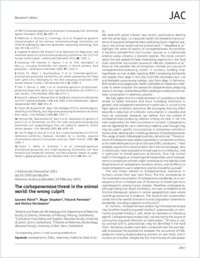The carbapenemase threat in the animal world : the wrong culprit
- Poirel, Laurent Medical and Molecular Microbiology Unit, Department of Medicine, Faculty of Science, University of Fribourg, Switzerland
- Stephan, Roger Institute for Food Safety and Hygiene, Vetsuisse Faculty, University of Zurich, Switzerland
- Perreten, Vincent Institute of Veterinary Bacteriology, Vetsuisse Faculty, University of Bern, Switzerland
- Nordmann, Patrice Medical and Molecular Microbiology Unit, Department of Medicine, Faculty of Science, University of Fribourg, Switzerland
-
26.02.2014
Published in:
- Journal of Antimicrobial Chemotherapy. - 2014, vol. 69, no. 7, p. 2007-2008
English
We read with great interest two recent publications dealing with the same topic, i.e. the public health risk related to the occurrence of acquired carbapenemase-producing Gram-negative species in the animal world and the environment.1,2 Woodford et al.1 highlight the series of reports of carbapenemases found either in bacteria isolated from non-human sources or in Salmonella enterica subsp. enterica, a zoonotic species. This raises concern about the real spread of these threatening organisms in the food chain and other non-human sources of infection. Abraham et al.2 focus on the possible role of companion animals as a source of carbapenemase-producing strains in humans, building their hypotheses on two studies reporting NDM-1-producing Escherichia coli isolates from dogs in the USA, and OXA-48-producing E. coli and Klebsiella pneumoniae isolates, also from dogs, in Germany. Both reports encourage public health authorities to implement measures to better evaluate the spread of carbapenemase-producing strains in animals, and reinforce efforts leading to a reduction of antibiotic consumption in veterinary practice.
- Faculty
- Faculté des sciences et de médecine
- Department
- Médecine 3ème année
- Language
-
- English
- Classification
- Pathology, clinical medicine
- License
- License undefined
- Identifiers
-
- RERO DOC 210117
- DOI 10.1093/jac/dku054
- Persistent URL
- https://folia.unifr.ch/unifr/documents/303561
Statistics
Document views: 96
File downloads:
- dku054.pdf: 90
